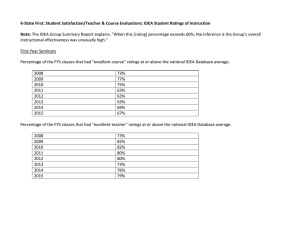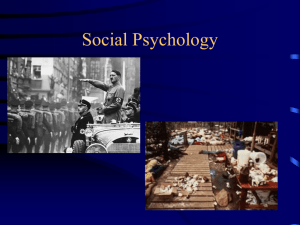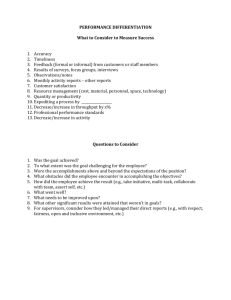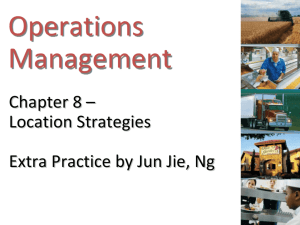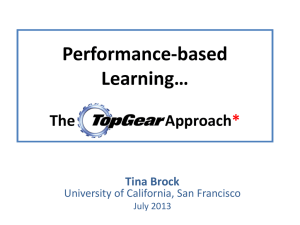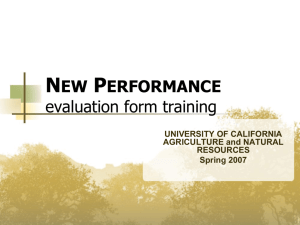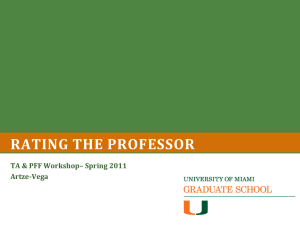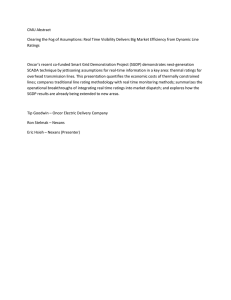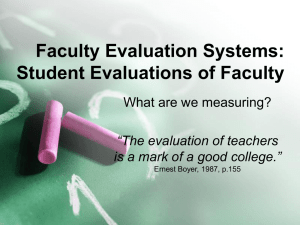Successful Online Implementation Depends on a Culture of Trust
advertisement
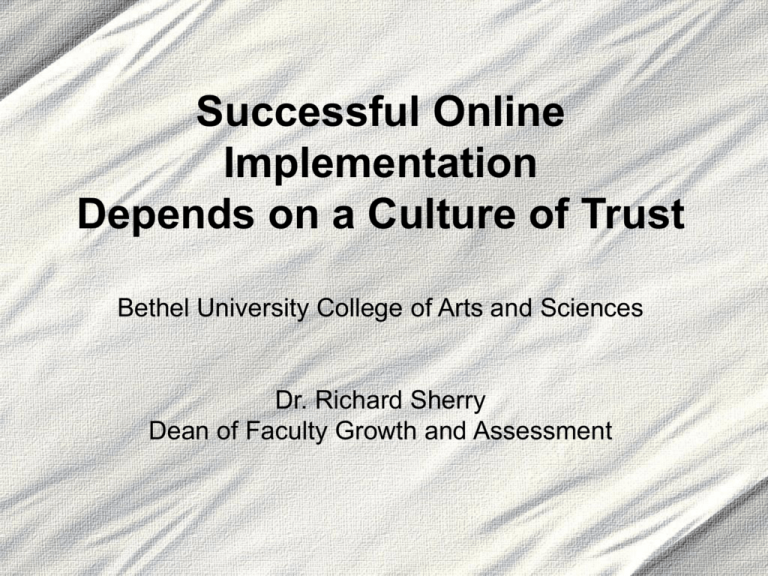
Successful Online Implementation Depends on a Culture of Trust Bethel University College of Arts and Sciences Dr. Richard Sherry Dean of Faculty Growth and Assessment IDEA Use at Bethel, 2006-07 Type Diagnostic, Paper Sections Percentage 39 4.5% Short form, Paper 117 13.5% Diagnostic, Online Short form, Online 272 437 31.4% 50.5% Total 865 Shift to Online Evaluation Increasing Online Participation DiagP ShortP DiagO ShortO 100% 90% 80% 70% 60% 50% 40% 30% 20% 10% 0% fall 2005 spring2006 fall2006 spring 2007 Normal Use of IDEA • Context of faculty evaluation – History of use at Bethel • General policies for use – Known policies that allow flexibility – General confidentiality – Use in a formative context – Evaluation and multiple voices – Acknowledgment of value and consequences Who speaks on teaching? Annual Reappointment • Faculty selfassessment • Department chair observation, review • Course evaluations • Additional observations if desired • • • • • • Promotion/Tenure Extended selfassessment Department chair Course evaluations 3 peers, including teaching 6 alumni Additional if desired Faculty Development and IDEA • New Faculty Orientation* • Guidance to faculty on interpretation and application • Approaches by personnel committees to interpretation* CRI • Follow up with Chair, Faculty Development Coordinator, or Dean • Direction for specific sessions on pedagogy, curricular discussions Committees Reading IDEA • Understand the scale • Take the long view (trends, types of classes) • Understand the context (kind of course) • Consider response rates and distribution • Look for key indicators • Consider the objectives • Read the comments FDI Faculty Concerns about Ratings • • • • • • • Earlier skeptical research repeatedly cited (google: misconceptions "student course evaluations") IDEA’s approach and “comparison” Student ratings of instruction and the “amenity” culture 9 “One bad course” Time invested Ceiling effect Exploring a new course and “grace” NO OTHER PROFESSOR uses the so called "university wide grading scale". A’s are generally accepted to be a good grade, and C’s are not good. No matter what you might think. This is a completely ridiculous grading system, as it makes the GPA go down in relation to other classes that don’t use this same scale.. . . Everyone else I know in other college writing classes is getting an A. I’m not saying that everyone deserves an easy A, but I know that I, and many other students work really hard to improve paper after paper, and it just doesn’t happen. FCR Pilot of IDEA Online and Growing Acceptance • • • • • The context for IDEA Online: reasonably robust technology Recruiting pilot cases Reasonable lead time Massive follow-up Successful reporting Engagement with Faculty on Concerns • • • Response rates Ratings differences “Ganging up” and “unsupervised” evaluations Continuing to respond to technology and faculty • • • Improvements in our processes Customizing group reports Customizing central questions – – – How has this course helped you connect this area of study to a Christian perspective? How has this course contributed to your development as a thinking Christian? How do you feel this course is influencing your life as a believer? Anatomy of a Failure Implementation at College of Adult and Professional Studies/ Graduate School • Neglect of the context • Inattention to politics • Failure to prepare students and faculty and communicate well Reminders • • • • • Communicate policies clearly Be appropriately flexible about evaluation Clarify “voice” and “weight” of ratings Create formative context Provide guidance on implementation and interpretation • Provide guidance on committee use Reminders (2) • Communicate to students on value of ratings • Manage response rates through monitoring technology • Prepare students for the forms • Reassure supervisory staff
